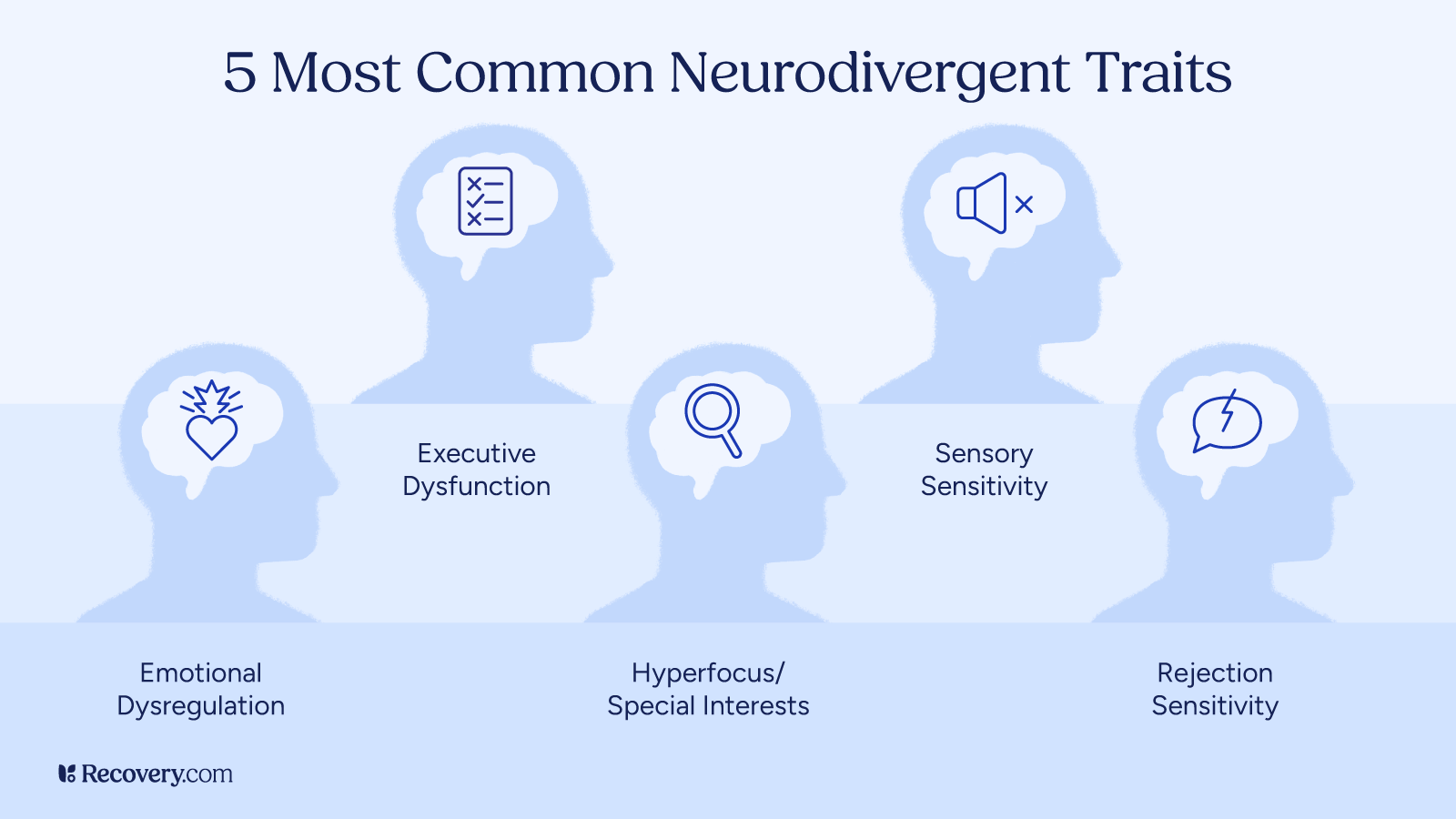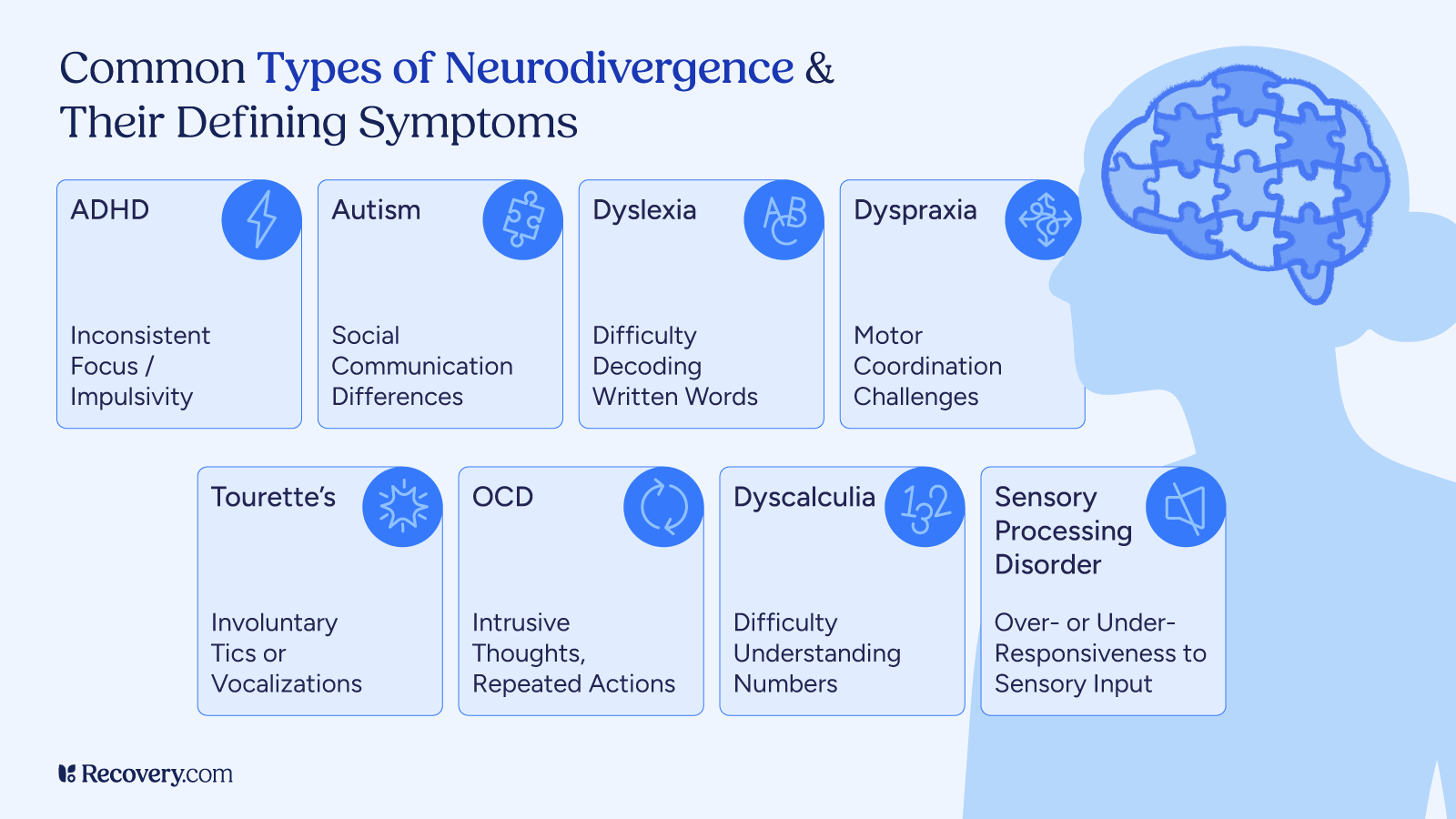Living with attention-deficit/hyperactivity disorder (ADHD) affects more than just focus and activity levels—it can shake up the foundation of your closest relationships, too. When ADHD is in the mix, partners often find themselves in a relationship that works a little differently than what they expected.
Maybe you’ve noticed patterns of forgotten promises, emotional highs and lows, or communication that keeps missing the mark. These aren’t signs of a doomed relationship or lack of love—they’re often just part of how ADHD shows up between people who care about each other.
Luckily, understanding these patterns is a first step toward creating a relationship that works for everyone involved. With some targeted strategies and mutual understanding, couples affected by adult ADHD can build connections that aren’t just surviving, but genuinely thriving.
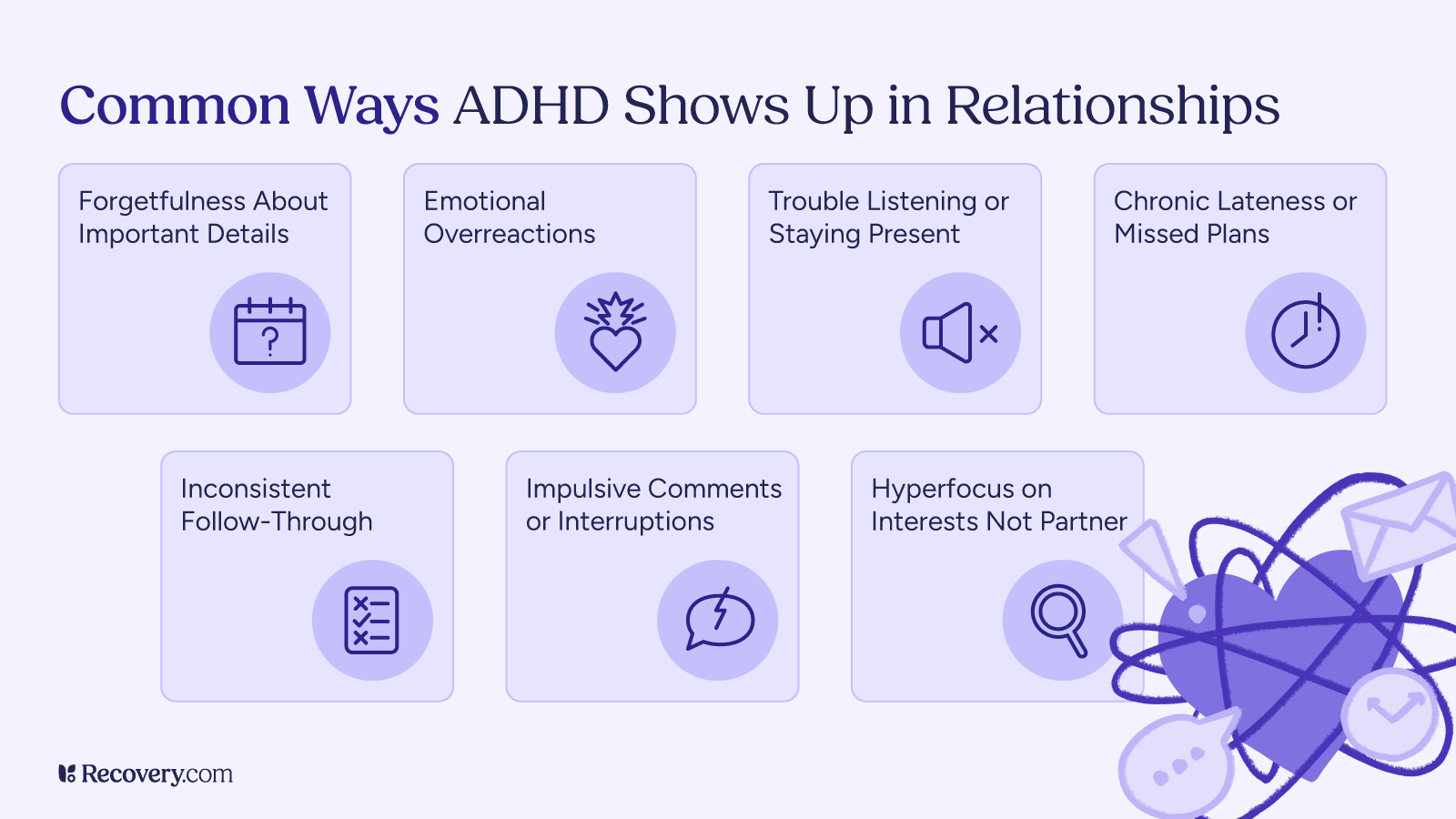
How ADHD Affects Relationships
ADHD affects about 4% of adults,1 but its influence on relationships often extends far beyond the person with the diagnosis. The core symptoms of ADHD—inattention, impulsivity, and sometimes hyperactivity—shape how people interact with their partners in both obvious and subtle ways.
Misinterpreting ADHD Behaviors
Misunderstandings about ADHD behaviors create hurt feelings for a lot of couples. When one partner consistently forgets important dates, interrupts conversations, or struggles with household responsibilities, the other might interpret these actions as signs of not caring. In reality, these behaviors typically stem from executive function differences in the ADHD brain,2 not a lack of love or commitment.
Many people with ADHD also experience what’s called “time blindness,” making it hard for them to estimate how long tasks will take or remember time-sensitive commitments. This can show up as procrastination, chronic lateness, and rushed preparations that put stress on everyone involved. To add to the frustration, challenges with emotional regulation can heighten reactions during disagreements and sometimes lead to emotional outbursts.
Research suggests that in romantic relationships where one partner has ADHD, the non-ADHD partner feels more dissatisfied4 when they don’t understand common behavioral patterns. But on the bright side, plenty of couples say once they recognize how ADHD influences their dynamics, they can develop strategies that work for their dynamic.
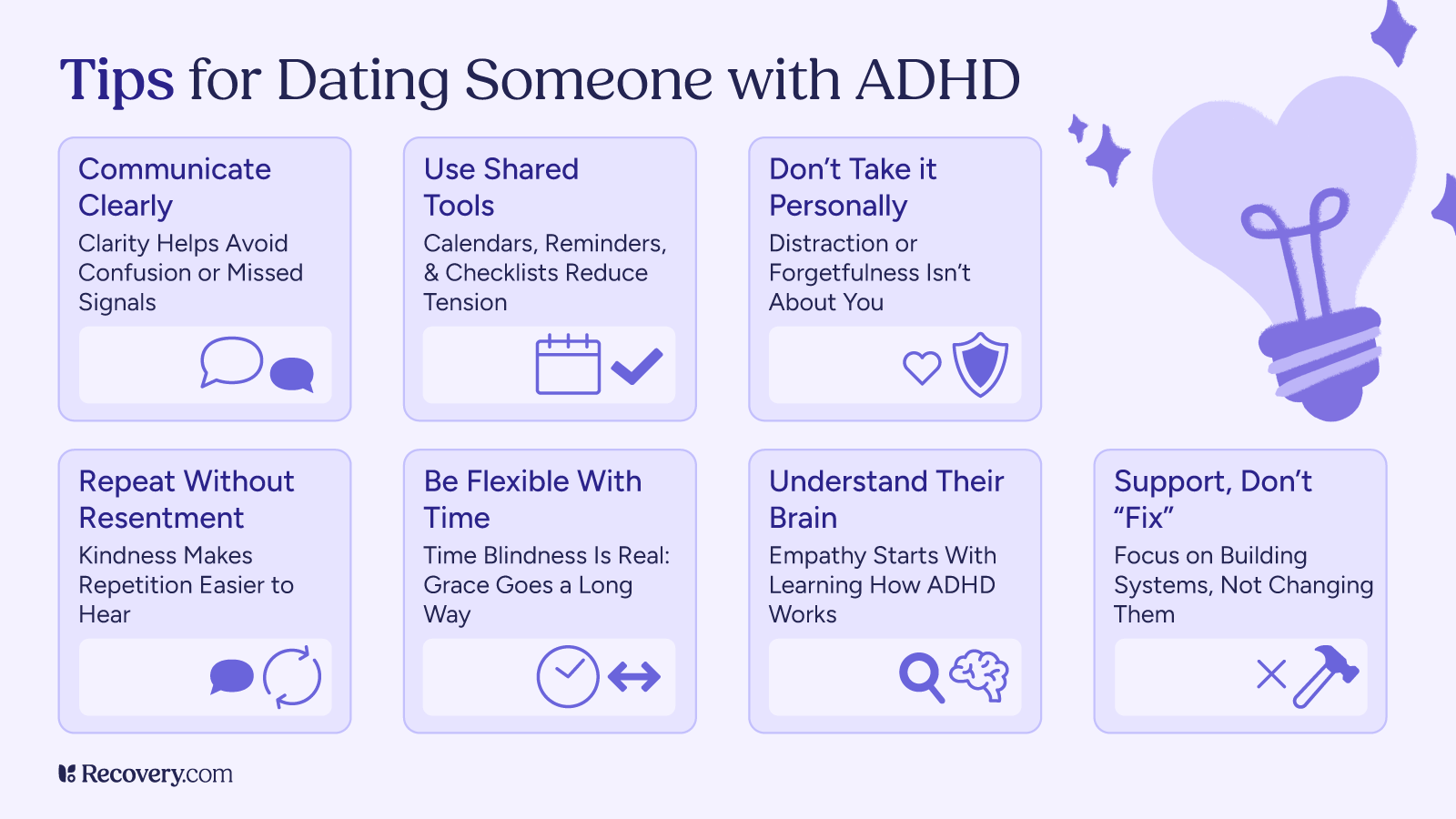
Common ADHD Relationship Patterns
Despite the challenges, people with ADHD can bring great qualities to their relationships. Many people with ADHD love deeply and passionately. They may be especially creative, spontaneous, or able to think outside the box when solving problems—all traits that can strengthen a healthy relationship.
Showing Affection
When it comes to showing love, ADHDers often have intense hyperfocus at the beginning of a relationship,4 showering their partners with attention, gifts, and enthusiasm. But when that naturally fades, they may struggle with consistent expressions of affection in daily life. This can be confusing for partners who value consistency, but the truth is that it’s not indifference; it’s an ADHD trait related to novelty-seeking.
We often see couples fall into a parent-child dynamic when one partner has ADHD. What specific strategies have you found most effective in helping couples break out of that pattern without making either partner feel blamed or inadequate?
A great strategy is externalizing the problem. It’s easy in these types of dynamics to label the person with ADHD as the ‘problem’, and then everything is run through that person being the main issue. Instead, couples should focus on ADHD as the issue and how it impacts the relationship, rather than getting down on one another. Focusing efforts on outsmarting ADHD together can bring you closer and help you recognize that the issue is not with one another, but with ADHD and how it influences the relationship.
Dr. David Tzall, Licensed Psychologist
Communication
Communication often follows similar patterns. Someone with ADHD may hyperfocus during important discussions but seem distracted during routine conversations. They might also interrupt or change topics quickly—not because they don’t value what their partner is saying, but because their brain is making connections at a different pace.
Parent-Child Dynamics
A big challenge for a lot of non-ADHD partners6 is feeling like they’re the responsible one in the relationship. This dynamic can create resentment if it’s not addressed openly. Meanwhile, the partners with ADHD can feel constantly criticized or misunderstood, wondering why their efforts don’t seem good enough.
Melissa Orlov, author of The ADHD Effect on Marriage, explains the parent-child dynamic in couples with ADHD:6
The non-ADHD partner often steps in to complete tasks in what they see as a more efficient way, leading to resentment when they feel they are doing more than their fair share…‘It’s easier to do it myself’ is efficient in the short term and can relieve anxiety, but does little to change the overall pattern for the better.
These patterns don’t mean relationships with ADHD are destined for problems. Understanding these tendencies empowers you to figure out solutions that meet everyone’s needs.
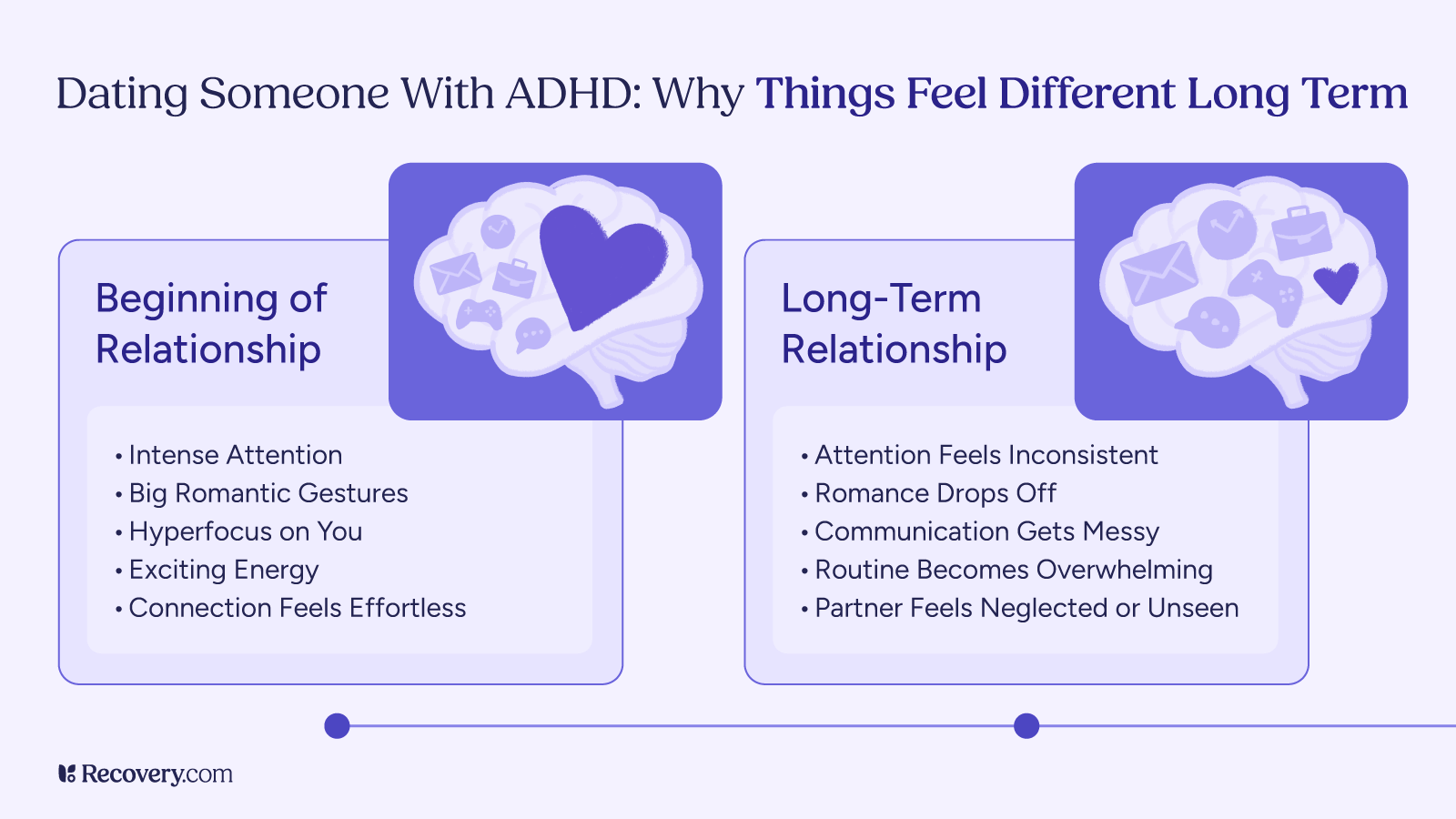
How to Build Stronger Relationships: Strategies for Couples
Building a thriving relationship where ADHD is involved means developing healthy coping mechanisms that work with your unique dynamics, not against them. Here are some practical approaches couples find helpful:
1. Communicate Clearly and Specifically
For many ADHDers, abstract requests like “help more around the house” can be overwhelming and hard to act on. Instead, try specific requests like: “Could you take out the trash before bed on Tuesdays and Thursdays?” Clarity like this helps everyone do better.
2. Use Visual Aids
Visual reminders can strengthen your communication significantly. Shared calendars, reminder apps, or strategically placed sticky notes serve as external memory aids that prevent misunderstandings about commitments. For many ADHDers, seeing information makes it more accessible than just hearing it. Consider creating a family command center with a whiteboard for important messages, a calendar for events, and color-coded systems for different family members.
Many non-ADHD partners struggle with feeling like their ADHD partner’s intense early relationship focus was somehow “fake” when it naturally fades. How do you help couples understand and navigate this shift in attention?
That intense early focus from an ADHD partner at a relationship’s beginning isn’t fake! It’s often fueled by the novelty of the new relationship and possibly a bit of hyperfixation. As the relationship begins to settle, so will those intense feelings, which may cause some uncertainty for the non-ADHD partner. For the person with ADHD, it’s valuable to attempt to practice mindfulness by paying attention on purpose without judgment in the relationship. This type of intentionality and presence will benefit both partners and will help foster communication and connection.
Tricia Johnson, LCSW
3. Build in Flexibility
While structure helps manage ADHD symptoms,7 too much rigidity can cause undue stress. The sweet spot is structured flexibility: Having routines but allowing room for adjustment.
Weekly check-ins, for example, can be especially helpful. Set a regular time to discuss what’s working, what isn’t, and what adjustments you need. These conversations work best when they’re short, positive, and solution-oriented.
4. Accept Different Time Styles
Time management differences8 often create conflict in your relationship. To work with time blindness, try creating buffer zones (extra time before deadlines or appointments) to reduce stress for everyone.
You can also use written reminders. Psychiatrist Dr. Tracey Marks recommends,9
If you need a task completed by a specific time, write it down and be specific. You probably also need to anticipate the consequences for them, because remember the person with ADD has trouble with planning and foresight.
For important events, consider handling time-sensitive preparations yourself while your ADHD partner contributes in ways that can be done ahead of time. Strategies like these use both your strengths without causing more frustration.
5. Lean Into Your Strengths
Your relationship will work better when you both handle tasks that align with your natural abilities. If your ADHD partner excels at spontaneous problem-solving but struggles with routine chores, consider dividing responsibilities accordingly.
Supporting Your Partner With ADHD
Supporting your ADHD partner isn’t about managing them—it’s about creating an environment where you both can thrive.
Recognize Effort Over Results
Your ADHD partner often puts a lot of work into tasks that still don’t turn out perfectly. Noticing their efforts instead of focusing solely on the results can go a long way in improving your connection.
Separate the Person From the Symptoms
During frustrating moments, remind yourself that ADHD behaviors aren’t personal choices.10 Your partner isn’t deliberately forgetting important events or leaving tasks unfinished—these are manifestations of how their brain works.
This perspective shift doesn’t mean accepting harmful behaviors, but it does grow compassion that makes problem-solving easier.
Maintain Your Own Boundaries
Supporting your loved one with ADHD shouldn’t come at the expense of your own mental health. Setting clear boundaries about what you need and what you can reasonably offer will help you prevent burnout and resentment.
As a non-ADHD partner, finding community with others in similar relationships can give you some very helpful emotional support and practical strategies. Support groups and online forums like these are safe spaces where you can talk about your experiences and explore solutions:
- The ADDA (Attention Deficit Disorder Association) has online support groups and workshops, plus a manual if you want to start your own.
- CHADD (Children and Adults with Attention-Deficit/Hyperactivity Disorder) offers local support groups and resources across the U.S. and internationally.
- ADDitude Magazine hosts a free ADHD support group for adults on Facebook.
When and Where to Look for Professional Help
Sometimes relationships benefit from additional support. Consider reaching out to a therapist if you notice:
- Your conflicts about ADHD-related issues are becoming more frequent or intense
- You’re falling into unhealthy patterns, such as parent-child dynamics
- One or both of you frequently feel unhappy or misunderstood
- ADHD symptoms are significantly impacting important areas of your life, like work or finances
When working with couples where ADHD plays a role, how do you help them develop communication systems that stick long-term (rather than just working for a few weeks before falling apart)?
When ADHD is present in a relationship, long-term communication success relies on consistency over intensity and a lot of psycho-education. Instead of dramatic overhauls to the relationship foundation, I help couples build simple, repeatable systems, like weekly check-ins or cue-based reminders, that are easy to use and realistic to incorporate into busy schedules. We also address emotional reactivity by teaching partners how to pause, clarify, listen, and reconnect during moments of flooding or dysregulation. The goal is to make communication feel sustainable, not exhausting.
Rebecca Tenzer, MAT, LCSW, CCTP, CGCS, CCATP, CCFP, CIMPH | Astute Counseling & Wellness Services
Behavioral Therapy
Couples therapy with a mental health professional who understands ADHD can be especially helpful. An experienced therapist can help you create strategies and facilitate conversations with your partner about relationship issues. A lot of couples find that even a few sessions really improve their communication and understanding.
ADHD Coaching
ADHD coaching11 is another valuable resource. A coach can help your partner develop systems for managing time, completing tasks, and addressing disorganization—all of which help reduce relationship stress.
If you suspect undiagnosed ADHD, asking them if they’d be open to getting an evaluation might open a door to more effective solutions. If they have better resources for managing their ADHD, it could significantly improve your relationship dynamics.
Loving Someone With ADHD Doesn’t Have to Be Hard
Living with someone with ADHD brings unique challenges, but it also brings opportunities for connection and growth. Learning how ADHD affects your relationship patterns, communicating clearly, and co-creating strategies that work with ADHD traits can help you build a stronger partnership.
On this journey, remember to aim for progress, not perfection. What matters most is creating a relationship where both of you feel valued, supported, and seen.
If you or your significant other is struggling with ADHD symptoms that impact your relationship, treatment can make a real difference. Find ADHD specialists near you and speak to someone about your goals today.
FAQs
Q: How does an ADHD person show love?
A: ADHDers often show love through enthusiastic bursts of affection rather than consistent daily actions. They may express love through creative surprises, thoughtful gifts, and intense focus during quality time, but struggle with routine check-ins and small daily gestures of affection.
Q: Do people with ADHD struggle to keep relationships?
A: People with ADHD can maintain successful long-term relationships when both partners understand ADHD’s impact and develop effective coping strategies. ADHD relationships succeed when couples prioritize clear communication, establish supportive routines, and recognize that ADHD traits influence—but don’t determine—relationship outcomes.
Q: Can ADHD cause divorce or serious relationship problems?
A: Untreated ADHD can increase relationship conflict, which in turn can increase divorce risk—but there’s no conclusive evidence that ADHD leads to higher divorce rates. Issues usually stem from misinterpreted symptoms, communication difficulties, and uneven responsibilities. But effective treatment, ADHD-specific relationship strategies, and mutual understanding significantly reduce these risks.
What strategies help improve communication with someone who has ADHD?
Effective ADHD communication strategies include:
- Having clear, direct conversations
- Sending written follow-ups for important information
- Setting distraction-free times for discussions
- Making specific requests instead of general statements
- Implementing structures like regular check-ins
- Using visual aids like to-do lists to reinforce verbal communication
How can I support my ADHD partner without becoming their parent?
Support your ADHD partner as a teammate, rather than a manager, by:
- Establishing clear, equitable responsibilities
- Focusing on strengths instead of deficits
- Collaborating on systems that work with their brain
- Maintaining healthy boundaries
- Addressing parent-child-like dynamics early through open communication or professional counseling when needed

